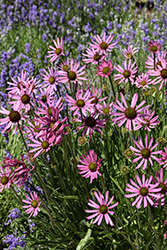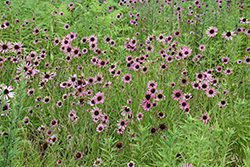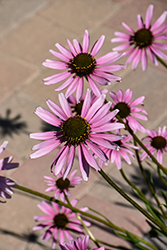Tennessee Coneflower
Echinacea tennesseensis
Plant Height: 16 inches
Flower Height: 24 inches
Spread: 18 inches
Sunlight:
![]()
![]()
Hardiness Zone: 4
Description:
Endangered native wildflower is only known to grow naturally near Nashville; star-like daisies with pink rays and copper-green centers; strong stems are great for cut flowers; birds eat the seeds; good for low water use gardening, isolate for pure seed
Ornamental Features
Tennessee Coneflower has masses of beautiful pink daisy flowers with coppery-bronze eyes at the ends of the stems from early to late summer, which are most effective when planted in groupings. The flowers are excellent for cutting. Its pointy leaves remain forest green in color throughout the season.
Landscape Attributes
Tennessee Coneflower is an herbaceous perennial with an upright spreading habit of growth. Its relatively coarse texture can be used to stand it apart from other garden plants with finer foliage.
This is a relatively low maintenance plant, and is best cleaned up in early spring before it resumes active growth for the season. It is a good choice for attracting butterflies to your yard, but is not particularly attractive to deer who tend to leave it alone in favor of tastier treats. It has no significant negative characteristics.
Tennessee Coneflower is recommended for the following landscape applications;
- Mass Planting
- Rock/Alpine Gardens
- Border Edging
- General Garden Use
- Naturalizing And Woodland Gardens
- Container Planting
Planting & Growing
Tennessee Coneflower will grow to be about 16 inches tall at maturity extending to 24 inches tall with the flowers, with a spread of 18 inches. It grows at a medium rate, and under ideal conditions can be expected to live for approximately 10 years. As an herbaceous perennial, this plant will usually die back to the crown each winter, and will regrow from the base each spring. Be careful not to disturb the crown in late winter when it may not be readily seen!
This plant does best in full sun to partial shade. It is very adaptable to both dry and moist growing conditions, but will not tolerate any standing water. It is considered to be drought-tolerant, and thus makes an ideal choice for a low-water garden or xeriscape application. It is not particular as to soil type or pH. It is somewhat tolerant of urban pollution. This species is native to parts of North America. It can be propagated by division.
Tennessee Coneflower is a fine choice for the garden, but it is also a good selection for planting in outdoor pots and containers. With its upright habit of growth, it is best suited for use as a 'thriller' in the 'spiller-thriller-filler' container combination; plant it near the center of the pot, surrounded by smaller plants and those that spill over the edges. Note that when growing plants in outdoor containers and baskets, they may require more frequent waterings than they would in the yard or garden. Be aware that in our climate, most plants cannot be expected to survive the winter if left in containers outdoors, and this plant is no exception. Contact our experts for more information on how to protect it over the winter months.
How can we help?
We encourage you to visit the garden center to explore our full offerings and connect with our team of experts. Our team is on hand to help with any questions you have, and can help you with memorials, deliveries, special orders, and tree planting and more…






